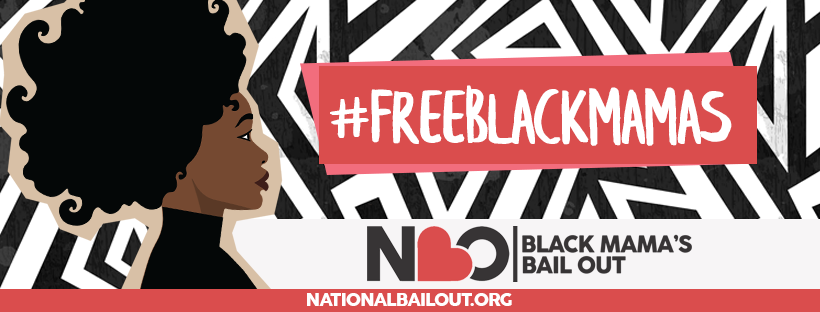
This year, remember the women who can’t celebrate Mother’s Day with their children because of the exploitation of black women in the criminal justice system. Help the work being done to make sure that women forced to remain in jail can be home with their children for Mother’s Day. This Mother’s Day will mark the third annual Black Mama’s Bail Out Campaign, a grassroots community-based movement focused on dismantling the cash bail requirement, “With cash or money bail, individuals awaiting trial, plea bargain or a conclusion to their case must remain in jail unless they (or a relative, bail bond agent, etc.) can pay for their release.”
Advocates nationwide will be coordinating to help free incarcerated Black mothers and caregivers in time for Mother’s Day. The bailouts are scheduled to start from May 6-12 into two dozen jurisdictions, including Cleveland, Memphis, Detroit, Baltimore, Philadelphia and Los Angeles.
The movement was launched May 2017 with a campaign to post bail for Black mothers who would otherwise be separated from their children on Mother’s Day, the campaign helping to free 100 women and sparking year-round movements. Other fundraising events center around Father’s Day, Juneteenth and Pride. The campaign will continue to highlight local organizing efforts as activists, “call on legislators, judges and district attorneys to abolish the cash bail system.” Such cash bail systems punish people with continued incarceration for living in poverty.
Nearly half a million people who have not been convicted of a crime are imprisoned on any given day because they can’t afford to pay bonds or bails, according to the Prison Policy Initiative. This system disproportionately affects the poor and communities of color including Black, Latinx and Native American women. Almost 70% of women in jail who can’t afford bail are mothers of children under the age of 16.
National Bail Out Collective has also worked to bring to the forefront the issues of mass incarceration as it affects women. Marbre Stahley-Butts, founding member of the movement and executive director for Law for Black Lives, has argued that the discussion also needs to focus on women’s growing rates in prison. “We know that right now, women are the fastest growing prison population. There’s a real need to talk about how these systems impact women,’ said Stahly-Butts, who believes such conversations should be inclusive of queer and trans women. Describing mothers and caregivers largely as ‘the backbone of our communities,’ she told Essence, ‘When one of these women is taken away, it’s their children, partners, and the entire community that suffers.” Even if individuals are later cleared of charges, current bail systems can be detrimental to these families; they lose jobs, housing, and child custody as they are forced to sit behind bars.
The movement and campaign work to end the racist and classist mechanisms that keep marginalized communities in jails without ever being convicted of crimes. Since its launch the National Bail Out Collective has helped secure the freedom of more than 300 individuals across the country, and $2 million have been raised by donors to fund bail and criminal justice reform work. This work also includes providing opportunities for previously incarcerated women.
“National Bail Out is a Black-led and Black-centered collective of abolitionist organizers, lawyers and activists building a community-based movement to support our folks and end systems of pretrial detention and ultimately mass incarceration. We are people who have been impacted by cages—either by being in them ourselves or witnessing our families and loved ones be encaged. We are queer, young, elder, and immigrant.”
You can still donate to help bring Black mothers home here.
(Image Credit: National Bail Out / Facebook )